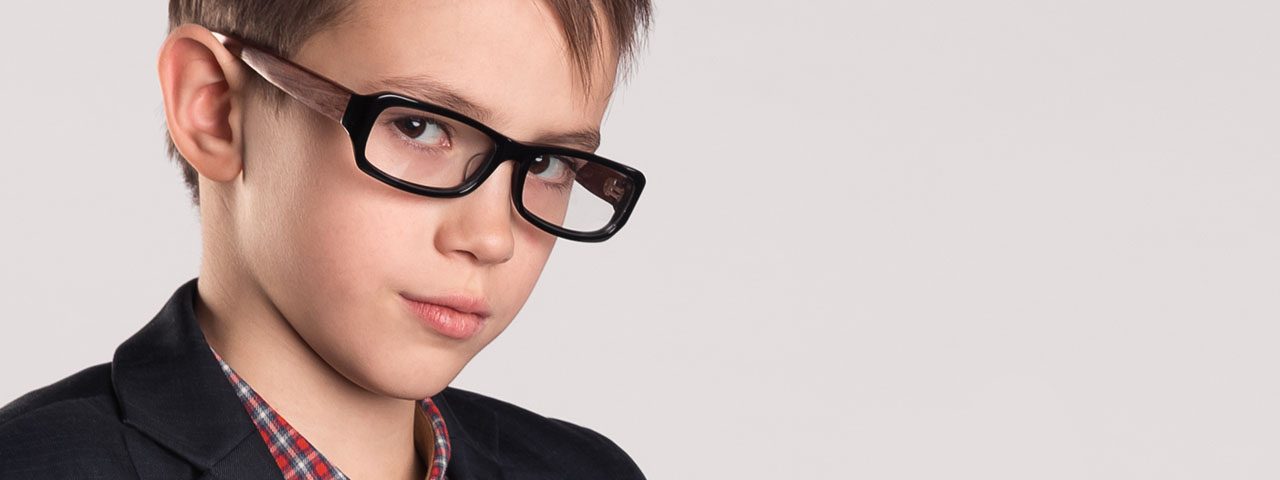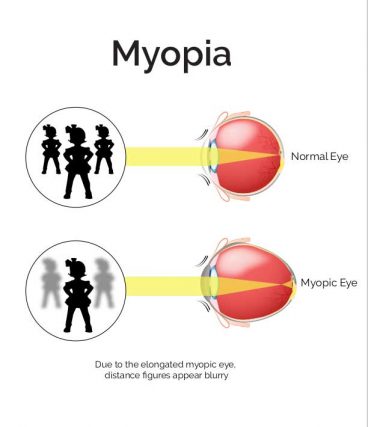
Why You Should Care About Myopia
Myopia is one of the most widespread vision problems in the world today, and the numbers are growing. Particularly troubling is that it is being diagnosed earlier in school children and rising in severity.
If you have a young child, we recommend regular eye exams because the condition is known to progress rapidly throughout childhood, causing significant risk to your child’s eye health in the long term.
Visit Dr. Colleen Mitchell and Dr. Adrianna Hempelmann at Blacksburg Eye Associates to learn more about myopia and myopia management.
1 in 3 Children Have Myopia
Statistics show an alarming increase in myopia (nearsightedness) among children—25% in the past 40 years alone. Today, myopia affects 40% of the population, and by the year 2050, half of the world’s population is expected to be myopic.
More than 50% of parents are unaware that myopia increases the risk of developing severe eye diseases such as glaucoma or retinal detachment later in life.
Many researchers believe that increased use of digital devices and reduced time spent outdoors are among the causes.
Myopia Increases the Risk of Severe Eye Diseases
Myopia progresses rapidly during childhood. As the level of myopia increases, so does the risk of sight-threatening retinal damage, such as glaucoma, cataract, retinal detachment and myopic macular degeneration (maculopathy). Early treatment through myopia management can slow down or even stop the progression.
The level of myopia a child has is directly correlated to their risk of eye disease — the higher the myopia, the greater the risk.
Higher Risks With High Myopia
Glaucoma. Research shows that people with moderate or high myopia have a 50% higher risk of developing glaucoma.
Cataract. The rate of cataract surgery in people with high myopia is 17% higher than in patients with moderate myopia.
Retinal Detachment. A child between -0.75D and -3.00 is more than 3 times more likely to develop retinal detachment in the future. That number triples for individuals with high myopia (-5.00 and above).
The risk of myopic macula disease is also influenced by the level of a child’s nearsightedness. Children under -5.00 have just a 0.42% of developing this serious eye condition, but anything above -5.00 the risk level leaps to 25.3%.
Is Your Child at Risk?
Fill out our Myopia Assessment Quiz to find out.
What Is Myopia?
Myopia, also known as nearsightedness or shortsightedness, causes blurry distance vision, while near vision remains clear. This refractive error is often hereditary and develops in early childhood. If left untreated, it progresses rapidly until early adulthood. High levels of myopia can lead to serious vision impairment. It is the most common vision problem in the world today.
What Does a Myopic Eye Look Like?
In a healthy eye, light passes through the eye lens and comes into focus directly on the retina, located at the back of the eye. In a myopic eye, the eyeball is too long, and therefore the image comes into focus in front of the retina.

Should Your Child Wear Prescription Glasses?
Glasses enable your child to see clearly. However, they do not reduce peripheral hyperopia, which is considered to be the main reason why the eyeball grows longer and myopia progresses.
By the time your child reaches adulthood, he or she may be at risk of severe eye disease due to the high level of myopia. Myopia management, on the other hand, slows down or even stops the progression. The prescription is kept low, and so is the risk.
Facts About Myopia Management
There is published evidence that
- Low-dose atropine has been effective in reducing the progression of myopia.
- Special contact lenses that reduce peripheral hyperopia can slow the progression of myopia.
- Orthokeratology treatment can decelerate myopia progression.
Myopia Management in Virginia for Your Child
Contact Blacksburg Eye Associates if the assessment above has shown that your child is at risk of developing myopia, or you feel the need for reassurance regarding your child’s vision. We will conduct an eye exam and offer methods of myopia management, proven to slow down myopia progression effectively.
Our practice serves patients from Blacksburg, Radford, Christiansburg, and New River Valley, Virginia and surrounding communities.
Resources:
- https://www.aoa.org/newsroom/myopia-rates-on-the-rise-syvm
- https://www.healio.com/…/increase-in-myopia-will-lead-to-rise-in-retinal-conditions
- https://onlinelibrary.wiley.com/doi/abs/10.1111/opo.12455
- https://www.nature.com/news/the-myopia-boom-1.17120
- https://www.ncbi.nlm.nih.gov/pmc/articles/PMC6688422/?report=classic



